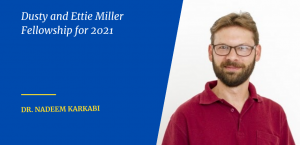
Dr. Nadeem Karkabi is awarded the Dusty and Ettie Miller Fellowship Award for 2021
In the News Dr. Nadeem Karkabi (Department of Anthropology) is the winner of the Dusty and Ettie Miller Fellowship for Outstanding Young Scholars for 2021. The
 A new study has found that the interferon beta (IFN-ẞ) protein plays an important role in limiting the immune system’s role in inflammation and preventing deleterious outcomes of infection and trauma. IFN-ẞ promotes the healing process by enhancing the programmed cell death of inflamed white blood cells, accelerating the “cleaning” of the remnants of the dead cells from the tissues, and facilitating the rehabilitation of tissues damaged by inflammation. The researchers also hypothesize that IFN-ẞ “puts the body on a state of alert” for a potential fight against viruses liable to “attack” immediately after the bacterial inflammation. “There is already a drug based on IFN-ẞ that was developed for other purposes. Our study unravels the opportunity to use and develop IFN-ẞ-based drugs to treat additional diseases, such as chronic inflammation, or even in cases of infection with lethal bacteria that causes robust inflammation in a short period of time, leading to systemic multi-organ failure” explains Dr. Amiram Ariel of the Department of Human Biology, who conducted the research, which was published in the journal Nature Communications.
A new study has found that the interferon beta (IFN-ẞ) protein plays an important role in limiting the immune system’s role in inflammation and preventing deleterious outcomes of infection and trauma. IFN-ẞ promotes the healing process by enhancing the programmed cell death of inflamed white blood cells, accelerating the “cleaning” of the remnants of the dead cells from the tissues, and facilitating the rehabilitation of tissues damaged by inflammation. The researchers also hypothesize that IFN-ẞ “puts the body on a state of alert” for a potential fight against viruses liable to “attack” immediately after the bacterial inflammation. “There is already a drug based on IFN-ẞ that was developed for other purposes. Our study unravels the opportunity to use and develop IFN-ẞ-based drugs to treat additional diseases, such as chronic inflammation, or even in cases of infection with lethal bacteria that causes robust inflammation in a short period of time, leading to systemic multi-organ failure” explains Dr. Amiram Ariel of the Department of Human Biology, who conducted the research, which was published in the journal Nature Communications.
The process by which an inflammation develops in the body occurs when a bacteria (pathogen) penetrates a target tissue. Certain white blood cells (neutrophils) leave the blood vessels and enter the tissue, fighting the invader in order to eliminate it and remove it from the tissue and the host altogether. In healthy situations, when the cells manage to eradicate the bacteria, inflammation is terminated upon these white cells undergoing programmed cell death. At this stage, a different type of white blood cell (macrophages) take control of the inflammatory process, with the goal of engulfing the dead cells and tissue debris and restoring normal tissue structure and function. Defects in this process may lead to a state where the host’s immune system continues to harm the affected tissue even when this is no longer necessary. This may lead to tissue scarring or to the development of autoimmune diseases. Tissue scarring may also occur when inflammation becomes chronic and does not resolve properly. In the case of inflammation in internal organs, such as the liver or lungs, tissue scarring may lead to loss of function of the affected organ, necessitating an organ transplantation and in severe cases leading to death.

In the News Dr. Nadeem Karkabi (Department of Anthropology) is the winner of the Dusty and Ettie Miller Fellowship for Outstanding Young Scholars for 2021. The

In the News Dr. Emma Maayan-Fanar (Art History Department) and Father Remy Kurowski, Chaplin of the French Speaking Catholic Community in Hong Kong led the online

In the News Prof. David Roe (Department of Community Mental Health) is at the forefront of promoting improved mental health services and combating damaging stigmas
© University of Haifa Division of External Relations